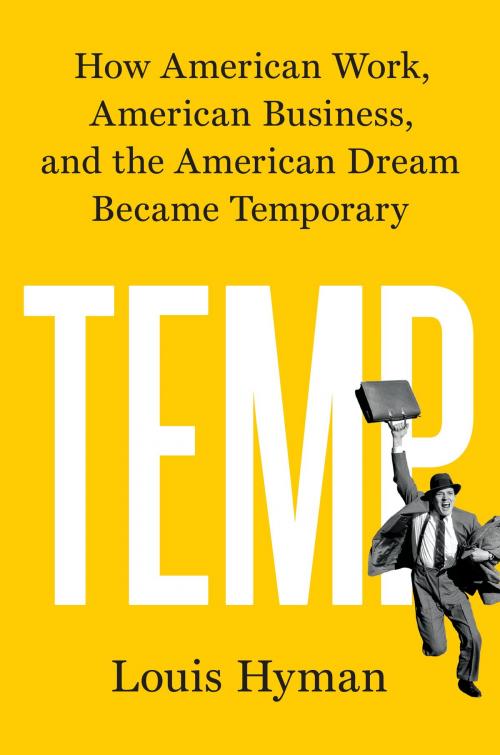Temp
How American Work, American Business, and the American Dream Became Temporary
Business & Finance, Career Planning & Job Hunting, Labor, Business Reference, Corporate History, Nonfiction, History, Americas, United States, 20th Century| Author: | Louis Hyman | ISBN: | 9780735224094 |
| Publisher: | Penguin Publishing Group | Publication: | August 21, 2018 |
| Imprint: | Viking | Language: | English |
| Author: | Louis Hyman |
| ISBN: | 9780735224094 |
| Publisher: | Penguin Publishing Group |
| Publication: | August 21, 2018 |
| Imprint: | Viking |
| Language: | English |
**Named a "Triumph" of 2018 by New York Times Book Critics
Shortlisted for the 800-CEO-READ Business Book Award
The untold history of the surprising origins of the "gig economy" --how deliberate decisions made by consultants and CEOs in the 50s and 60s upended the stability of the workplace and the lives of millions of working men and women in postwar America.**
Every working person in the United States asks the same question, how secure is my job? For a generation, roughly from 1945 to 1970, business and government leaders embraced a vision of an American workforce rooted in stability. But over the last fifty years, job security has cratered as the postwar institutions that insulated us from volatility--big unions, big corporations, powerful regulators--have been swept aside by a fervent belief in "the market." Temp tracks the surprising transformation of an ethos which favored long-term investment in work (and workers) to one promoting short-term returns. A series of deliberate decisions preceded the digital revolution and upended the longstanding understanding of what a corporation, or a factory, or a shop, was meant to do.
Temp tells the story of the unmaking of American work through the experiences of those on the inside: consultants and executives, temps and office workers, line workers and migrant laborers. It begins in the sixties, with economists, consultants, business and policy leaders who began to shift the corporation from a provider of goods and services to one whose sole purpose was to maximize profit--an ideology that brought with it the risk-taking entrepreneur and the shareholder revolution and changed the very definition of a corporation.
With Temp, Hyman explains one of the nation's most immediate crises. Uber are not the cause of insecurity and inequality in our country, and neither is the rest of the gig economy. The answer goes deeper than apps, further back than downsizing, and contests the most essential assumptions we have about how our businesses should work.
**Named a "Triumph" of 2018 by New York Times Book Critics
Shortlisted for the 800-CEO-READ Business Book Award
The untold history of the surprising origins of the "gig economy" --how deliberate decisions made by consultants and CEOs in the 50s and 60s upended the stability of the workplace and the lives of millions of working men and women in postwar America.**
Every working person in the United States asks the same question, how secure is my job? For a generation, roughly from 1945 to 1970, business and government leaders embraced a vision of an American workforce rooted in stability. But over the last fifty years, job security has cratered as the postwar institutions that insulated us from volatility--big unions, big corporations, powerful regulators--have been swept aside by a fervent belief in "the market." Temp tracks the surprising transformation of an ethos which favored long-term investment in work (and workers) to one promoting short-term returns. A series of deliberate decisions preceded the digital revolution and upended the longstanding understanding of what a corporation, or a factory, or a shop, was meant to do.
Temp tells the story of the unmaking of American work through the experiences of those on the inside: consultants and executives, temps and office workers, line workers and migrant laborers. It begins in the sixties, with economists, consultants, business and policy leaders who began to shift the corporation from a provider of goods and services to one whose sole purpose was to maximize profit--an ideology that brought with it the risk-taking entrepreneur and the shareholder revolution and changed the very definition of a corporation.
With Temp, Hyman explains one of the nation's most immediate crises. Uber are not the cause of insecurity and inequality in our country, and neither is the rest of the gig economy. The answer goes deeper than apps, further back than downsizing, and contests the most essential assumptions we have about how our businesses should work.















